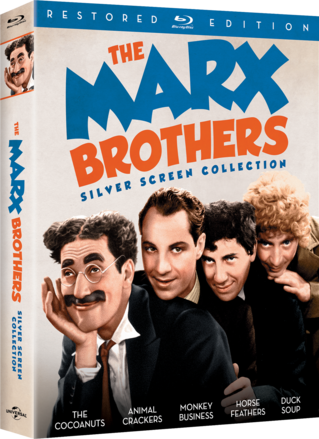
Monkey Business
(1931)


The post-Code, pre-p.c. Marx Brothers comedy Monkey Business keeps plot at a minimum, anarchy at a maximum, which is a good place to be for the fearless foursome of 1930s screen comedy. In their first original screen adventure (after two adaptations of hit stage productions), Groucho, Chico, Harpo, and Zeppo play unnamed stowaways on an ocean liner traversing the Atlantic. It's a full twenty minutes into the picture before there's any more plot than the boys running away from ship stewards and getting into general mischief, which shows a narrative chutzpah that's kind of amazing in and of itself.
The plot initiates when Groucho happens upon this film's crook and vamp, Alky Briggs (Harry Woods) and Lucille Briggs (Thelma Todd). Alky's in a gang war with racketeer "Big Joe" Helton (Rockliffe Fellows), and our boys wind up idly taking sides as bodyguards and henchmen. The film's second act plays out at a house party before a kidnapping leads to the climax in a barn. The Marx Brothers save the day, with Zeppo unironically doing the fisticuffs while Chico and Harpo comically knockabout and Groucho does play by play. In fact, Monkey Business wisely promotes the undervalued Zeppo to romantic lead (opposite Ruth Hall as Helton's daughter). While this doesn't afford Zeppo comic opportunities, his experienced charm makes the film's requisite romantic scenes less dull.
The party sequence affords opportunities for Chico's piano solo ("Pizzicato"/"When I Take My Sugar to Tea") and Harpo's harp solo ("I'm Daffy Over You," which Chico played in Animal Crackers), but this film's most memorable music scenes are the boys singing "Sweet Adeline" in four-part harmony from their hiding spot in the hold (barrels of kippered herring), pausing to bang out a tune while on the run, and the Maurice Chevalier sketch, in each of the four Marxes attempts to pass off the singer's stolen passport as his own by performing a snippet of "You Brought a New Kind of Love to Me" (a new spin on a sketch they performed on stage in the '20s).
This film's screen credit goes to S.J. Perelman and Will B. Johnstone, with additional dialogue by Arthur Sheekman, all trusted writers for the Marxes. Groucho gets plenty of opportunities for verbal wit ("I wish you'd keep my hands to yourself") and physical comedy (lots of his loping, lurching walk and ridiculous dancing, including a bed-romping tango with Todd); he even does impressions—of Chevalier, a cowboy, and a cat. Harpo gets a centerpiece sequence delighting children by hijacking a Punch and Judy show, and he and Chico amusing pose as barbers (trimming "a little snoop" at a time from a customer's moustache). To paraphrase one running gag, if you want excitement, if you want to hot-cha-cha, getting into some Monkey Business is still a good way to go.
 |
|
 |
Universal has gifted fans with The Marx Brothers' Blu-ray debut in the three-disc The Marx Brothers Silver Screen Collection Restored Blu-ray Edition . The main review page linked here details the set's bonus features and link to reviews of the other films.
Monkey Business comes out of the gate with some light but noticeable scratches. These come and go a bit but mostly go in what turns out to be a familiar-looking source but much-improved presentation over previous home-video releases. Detail gets a significant boost, and grain is well-resolved in glorious, well-calibrated black and white. Sound comes in a clean and clear lossless DTS-HD Master Audio 2.0 track that's an authentic presentation of the original mono sound.
Animal Crackers also gets one film-specific bonus feature, a feature commentary with Marx Bros. Historian/Author Robert S. Bader and Bill Marx (Son of Harpo Marx). This is a good pairing, with Bader steadily coaxing memories out of Marx when not giving his own historical perspective and observations. Kudos to Universal for springing for these commentaries, which do a great job of contextualizing each film in the Marx Brothers' career, addressing the film's specific development and production and reception, and providing biographical information about the cast and crew of each film.
 |
| Review gear: |
Panasonic Viera TC-P55VT30 55" Plasma 1080p 3D HDTV
Oppo BDP-93 Universal Network 3D Blu-ray Disc Player
Denon AVR2112CI Integrated Network A/V Surround Receiver
|
Pioneer SP-BS41-LR Bookshelf Speaker (2)
Pioneer SP-C21 Center Speaker
Pioneer SW-8 Subwoofer
|
|---|





